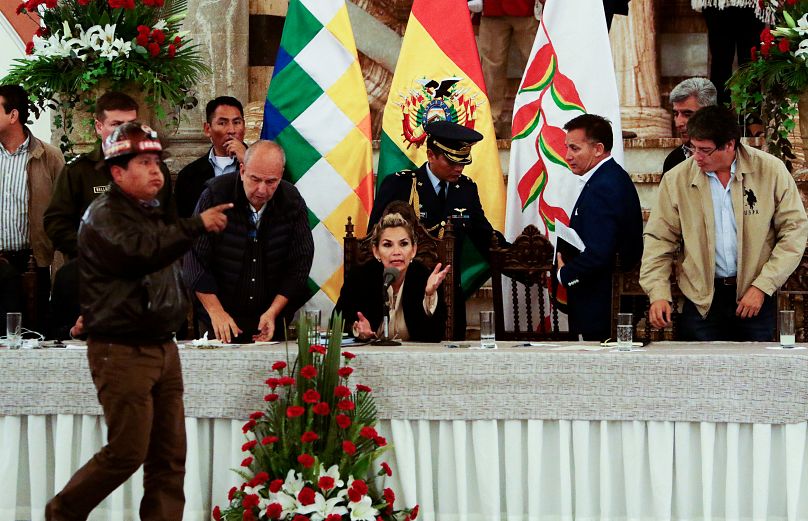Bolivia's interim President Jeanine Áñez has enacted the law to appoint a new electoral board that will be tasked with setting a date for a general election. The bill will bar candidates from running if they have served two presidential terms.
Bolivia's interim President Jeanine Áñez has passed a law that limits presidents to two terms and appoints a new board that will set a date for a general election.
 ADVERTISEMENT
ADVERTISEMENT
 ADVERTISEMENT
ADVERTISEMENT
Áñez pointed out her government's commitment to celebrate "fair elections," as opposed to the "fraud" of which she accuses Evo Morales in the October 20 vote.
After weeks of violent protests, Bolivia's provisional government and the leftist party MAS — Movement for Socialism — are paving the way for a new vote, this time without former President Evo Morales.
MAS party lawmakers, who hold a majority of seats in Congress, have agreed to find a new candidate.
Morales governed Bolivia from January 22, 2006. According to the Bolivian Constitution, only two continuous presidential terms are allowed, but Morales was aiming to be elected a fourth time.
This could bring an end to the country's political crisis, triggered by the October 20 general election result and Morales' controversial victory. He resigned on November 10 after almost twenty days of unrest.
The law of "exceptional and transitory Regime for the accomplishment of General Elections" was unanimously approved by the Congress on Saturday. "I would like to thank our lawmakers for understanding and listening to the demands of the Bolivian people", she said on Twitter.
The developments have brought Bolivia the closest it has come yet to overcome the turmoil, as Añez's government and opponents trade accusations of fueling violence. More than 30 people have died in clashes between protesters and security forces since the October election. However, most have died since Morales stepped down on November 10.
Some opposition lawmakers and Morales supporters also pushed for guarantees they would not be persecuted. Earlier on Saturday, A´ñez said she would not sign a bill unexpectedly proposed by MAS that would give Morales immunity from prosecution.
Debate on the bill was suspended in the Senate on Saturday following a wave of criticism. In the highland city of El Alto on Saturday, road access to a natural gas plant that has been a focal point of protesters resumed, with vans packed with commuters dodging boulders, burned tires and other debris still scattered on streets.
Talks between the new Government and MAS will continue, with the Catholic Church and the European Union acting as mediators. More than a dozen social leaders, many of whom demanded A´ñez repeal a law that gave the military broad discretion in the use of force to restore order.











